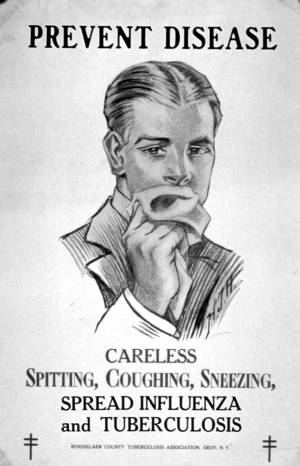
A public health poster from the Spanish flu era, circa 1919. Source: Wikimedia Commons.
A bill recently proposed by a City Council member, to lift a ban on spitting in public buildings, looked strange when it appeared on a legislative agenda last Tuesday. Was there really a pro-spit lobby? And why had it come to Harrisburg?
But stranger still is the story behind the ordinance, which was drafted at the request of Councilwoman Shamaine Daniels.
Daniels, a first-termer who chairs council’s building and housing committee, said she requested the legislation after a constituent came to her in late August, complaining he’d been cited under an obscure health code against public spitting.
The constituent, Sheldon Grier, had visited the city clerk’s office towing a stack of citations, at least some of them under a code that prohibits spitting “upon the floor of public buildings or buildings used for public assemblage or in buses or any other public conveyance.”
The rule is one of several in a miscellaneous section of the city’s health laws, which also prohibits urinating or defecating on public property, using or selling lead breast shields, and polishing silverware with cyanide or other poisons.
Grier, 56, had not been cited in person, Daniels said. Indeed, Dave Patton, the city’s codes administrator, said that such citations are filed remotely and electronically.
Patton also said the officer whose name appears on the citations, Joseph Farrell, never cited Grier for spitting. He said Farrell had only cited Grier at various times for derelict properties he owned that violated building codes. How Farrell’s name wound up on any spitting citation is a mystery, he said.
In any case, Grier had the assistant clerk pass a message along to Daniels, noting that he felt he had been the victim of “unfair targeting.” After speaking with him, Daniels learned that Grier had once spent several days in jail as a result of his citations.
Whether the alleged expectoration itself actually landed Grier behind bars is not clear. Court records show that he spent several days locked up in April 2002, after being charged with public nuisance and reckless endangerment.
A separate docket, however, shows that a warrant for the same charges and same offense date, Jan. 1, 1999, was served in August of this year. The records show that those charges were ultimately withdrawn in October.
A senior clerk at the court of district judge Marsha C. Stewart said an officer had come and withdrawn the charges after determining the details were exactly the same as the case from 2002.
Grier had spent six days in jail in 2002 because he couldn’t afford bail, the clerk said. She also read out a statement of the charges, which described failing to secure a collapsing Market Street building Grier owned but made no mention of spitting.
The clerk said she was not sure why the 1999 incident would have resulted in two warrants, one of which was never discharged. She said it was possible that a prior clerk had accidentally entered the information twice in the court’s computer system.
Grier could not be reached. But a former landlord of his, Brad Boyer, who rented to Grier around the time he was charged, recalled that “the city came down on him for his condemned properties, even though every other property on the block looked just like his.” Grier was a “very good guy” and a good tenant, Boyer added.
The incident sent Daniels on an ongoing quest to find out who charged Grier for spitting—if anyone actually did. In the meantime, she introduced the ordinance to repeal the spit ban, saying she felt it was one of several outdated city ordinances whose punishments don’t suit their crimes.
Council did not vote Tuesday on the bill, after Daniels withdrew it at the last minute. Fellow council members weren’t interested, because they “see it as politicizing spitting in public,” she said.





